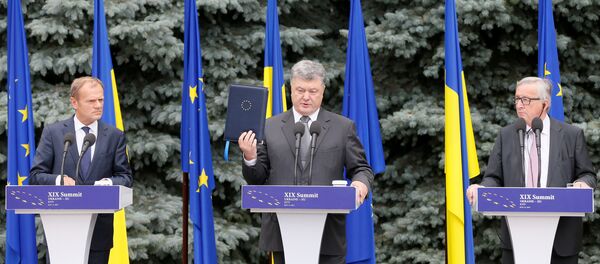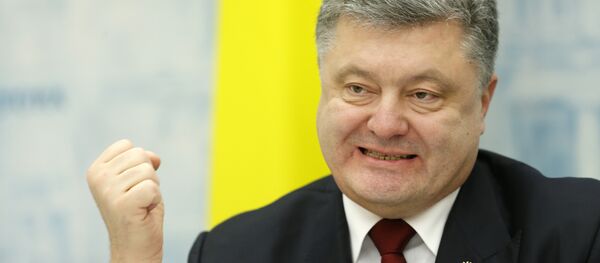The European Union is promoting its own project, a so-called "Marshall Plan" for Ukraine dubbed "The New European plan for Ukraine".
The authorship of the document belongs to the three Lithuanian politicians: two former Prime Ministers – Andrius Kubilius and Gediminas Kirkilas and former head of the Ministry of Foreign Affairs Petras Vaitiekunas.
Earlier this year, the "Marshall Plan for Ukraine" was officially approved by the Lithuanian Seimas (the country's unicameral parliament). In March, the Congress of the European People’s Party (EPP) included it in its final resolution.
"The EPP recognizes that in the current environment in the coming decade, it is difficult to expect Ukraine’s accession to the EU. However, the EPP should be aimed at strengthening its Eastern partnership. The successful transformation of Ukraine is an important element for strengthening civil society in other post-Communist countries, particularly in Russia. To save the motivation of Ukrainians to pursue difficult reforms, the EPP encourages the establishment of a broad investment package (Marshall Plan for Ukraine),” the Congress of the EPP stated in its final resolution.
Commenting on the suggested initiative, Vladimir Chernobai, an analyst with an investment company TeleTrade Group, called it quite a brave idea which could give a certain boost to the development of Ukraine. However, he pointed out that the plan contains a number of nuances.
"Initially, the Marshall Plan was set up to expand the influence of the US in the world. The US distributed loans to European countries, which then became obligated to the US," Chernobai said in an interview with Russia's Expert Online website.
"For Ukraine, getting loans has become a routine business. As of 2017, the country owes a debt of $63 billion and is planning to get $3-3.5 billion more from the International Monetary Fund (IMD) by the end of the year. From 2018 to 2020, it will need to pay off $18 billion of its debt. Kiev does not have any money to redeem it, hence, its needs to borrow more," the expert told the website.
Kirill Yakovenko, an analyst at Alor Broker, however thinks that under the "Marshall Plan", Volodymyr Groysman envisages a slightly different scenario of financial aid being provided to Ukraine than his Western partners.
Kiev is more interested in non-repayable aid in the form of trade preferences and financing of all sectors of its economy. However such a scenario is completely unprofitable for all the sponsors of the Ukrainian economy, the analyst said.
He further noted that there were several plans to aid Ukraine under the same very name, the "Marshall Plan," and it is hard to suggest which one that Volodymyr Groysman supports. It might be the one earlier proposed by Ukrainian oligarch Firtash, which sees aid been given to Ukraine through the country's businesses.
The plan however has a number of disadvantages. The major beneficiaries of this plan are Ukrainian oligarchs, who would be given the chance to strengthen their economic and political influence in Ukraine and Europe. This plan requires considerable reforms and large financial investments, including from the US. However due to the gradual wrap up of the "Ukrainian project" by the new administration of the White House, it is highly unlikely that this project will ever be implemented.
Yakovenko therefore says that Kiev urgently needs a new plan. Until the end of the year, the country should pay off debts worth $1.4 billion. In addition, it needs to redeem $2 billion more of interest from earlier debt obligations. This is not taking into account the $3 billion that Ukraine owes to Russia.
However these are all trifles, he says, taking into account future payments. So far, Ukraine starts paying off the debts it accumulated during the first years of the Poroshenko administration. At that point, the foreign debt of Ukraine was $22 billion, which already was an overwhelming burden for its budget.
"It would not be an exaggeration to say that Ukraine has one foot in the deepest debt pit: by the end of 2019, the country has to find $14 billion. The IMF tranches won't be enough, neither will it be able to increase the volumes of its borrowings on stock markets. Next year the country is planning to borrow $2 billion, however the stakes with each new borrowing will only go up, as will the risks of default. Nobody will be eager to buy the debts of a country in pre-default condition, even for humanitarian reasons. The interest rate of 7,5% is already too high for Ukraine," the analyst said.
The search for alternative sources of financing seems to be a priority for the government. Eurointegration and the visa-free regime might be very positive achievements but they become meaningless when there is simply no money in the country, he said.
"Unfortunately, instead of working on real plans for the development of the country's economy, Groysman once again is turning to the West with an outstretched hand in hope that it will simply donate the money. However the chances are low that it will happen. The "Marshall Plan" for Ukraine is a highly costly initiative, which requires massive investments in all the sectors of its economy. The US has this money, but Trump, unlike Obama, does not show any visible interest in Ukraine. Moreover, he is cutting the financing of the Ukrainian project," Yakovenko concluded.






